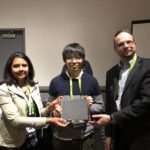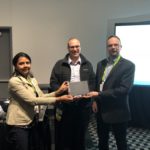Sunita Chandrasekaran, University of Delaware, Newark, DE, USA
Guido Juckeland, Helmholtz-Zentrum Dresden-Rossendorf, Dresden, Germany
Sandra Wienke, RWTH Aachen University, Aachen Germany
SUNDAY, NOV 11, 2018, 9am – 12:30pm
Proceedings available
The proceedings of the workshop are now available at: https://link.springer.com/book/10.1007/978-3-030-12274-4
About the Workshop
Current hardware trends lead to ever more complex compute node architectures offering multiple, heterogeneous levels of massive parallelism. As a result the ‘X’ in MPI +X demands more focus. A node in a future exascale system is expected to consist of GPU-like accelerators combined with processor architectures of other types. In order to exploit the maximum available parallelism out of such systems, we are in dire need of sophisticated programming approaches that can provide scalable as well as portable solutions without compromising on performance. The expectation from the scientific community is that such solutions should allow programmers to maintain a single code base whenever possible and to avoid requiring maintaining and debug multiple versions of the same code.
Raising the abstraction of the code is one of the effective methodologies to reduce the burden on the programmer. At the same time such a methodology will require a heroic compiler to be designed. Software abstraction-based programming models such as OpenMP and OpenACC have been serving this purpose over the past several years. These programming models address the ‘X’ component by providing programmers high-level directive-based approaches to accelerate and port scientific applications to heterogeneous platforms. Such programming paradigms played a decisive role in establishing heterogeneous node architectures as a valid choice for a multitude of HPC workloads.
The focus of this workshop is to explore this ‘X’ component in a hybrid MPI +X programming approach. We are looking forward to technical papers discussing innovative high-level language features and their (early prototype) implementations needed to address hierarchical heterogeneous systems, stories and lessons learnt while using directives to migrate scientific legacy code to parallel processors, state-of-the-art compilation and runtime scheduling techniques, techniques to optimize performance, mechanisms to keep communication and synchronization efficient.
We are looking forward to hosting WACCPD at SC18. In the past four years of this workshop, WACCPD has been one of the major forums at SC to bring together programming model users, developers, and tools community to share knowledge and experiences to tackle emerging complex parallel computing systems.
Impressions from the 2017 workshop
- Best Paper #1
- Best Paper #2

